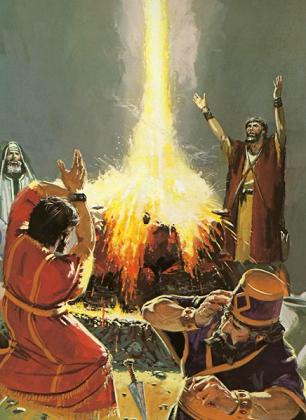Jonah is a type of Christ. What? Well, the Savior himself said on "two occasions when he was asked for a sign from heaven. In each case he gave “the sign of the prophet Jonah,” the event in that prophet’s life being a foreshadowing of Jesus’ own death and resurrection" (Matt. 12: 39-41; Matt. 16: 4; Luke 11: 29-30) Bible Dictionary "Jonah"
"Jonah was a type of Christ in that he was in the belly of the whale—in “hell,” in his own words ( Jonah 2:2 )—just as Jesus was in the grave for three days, and then came forth again. C. F. Keil and F. Delitzsch showed that the significance of Jonah’s story is broader than that:
“The mission of Jonah was a fact of symbolical and typical importance, which was intended not only to enlighten Israel as to the position of the Gentile world in relation to the kingdom of God, but also to typify the future adoption of such of the heathen, as should observe the word of God, into the fellowship of the salvation prepared in Israel for all nations" (Old Testament Student Manual- Jonah
And continuing on in this quote, I find this fascinating, but a little long:
“As the time drew nigh when Israel was to be given up into the power of the Gentiles, and trodden down by them, on account of its stiff-necked apostasy from the Lord its God, it was very natural for the self-righteous mind of Israel to regard the Gentiles as simply enemies of the people and kingdom of God, and not only to deny their capacity for salvation, but also to interpret the prophetic announcement of the judgment coming upon the Gentiles as signifying that they were destined to utter destruction. The object of Jonah’s mission to Nineveh was to combat in the most energetic manner, and practically to overthrow, a delusion which had a seeming support in the election of Israel to be the vehicle of salvation, and which stimulated the inclination to pharisaical reliance upon an outward connection with the chosen nation and a lineal descent from Abraham. . . . The attitude of Israel towards the design of God to show mercy to the Gentiles and grant them salvation, is depicted in the way in which Jonah acts, when he receives the divine command, and when he goes to carry it out. Jonah tries to escape from the command to proclaim the word of God in Nineveh by flight to Tarshish, because he is displeased with the display of divine mercy to the great heathen world, and because, according to ch. iv. 2 , he is afraid lest the preaching of repentance should avert from Nineveh the destruction with which it is threatened. In this state of mind on the part of the prophet, there are reflected the feelings and the general state of mind of the Israelitish nation towards the Gentiles. According to his natural man, Jonah shares in this, and is thereby fitted to be the representative of Israel in its pride at its own election. . . . The infliction of this punishment, which falls upon him on account of his obstinate resistance to the will of God, typifies that rejection and banishment from the face of God which Israel will assuredly bring upon itself by its obstinate resistance to the divine call. But Jonah, when cast into the sea, is swallowed up by a great fish; and when he prays to the Lord in the fish’s belly, he is vomited upon the land unhurt. This miracle has also a symbolical meaning for Israel. It shows that if the carnal nation, with its ungodly mind, should turn to the Lord even in the last extremity, it will be raised up again by a divine miracle from destruction to newness of life. And lastly, the manner in which God reproves the prophet, when he is angry because Nineveh has been spared ( ch. iv. ), is intended to set forth as in a mirror before all Israel the greatness of the divine compassion, which embraces all mankind, in order that it may reflect upon it and lay it to heart.” ( Commentary on the Old Testament, 10:1:383–85.)
Missionary work. Jonah's story is to help us as the children of Israel with missionary work.



